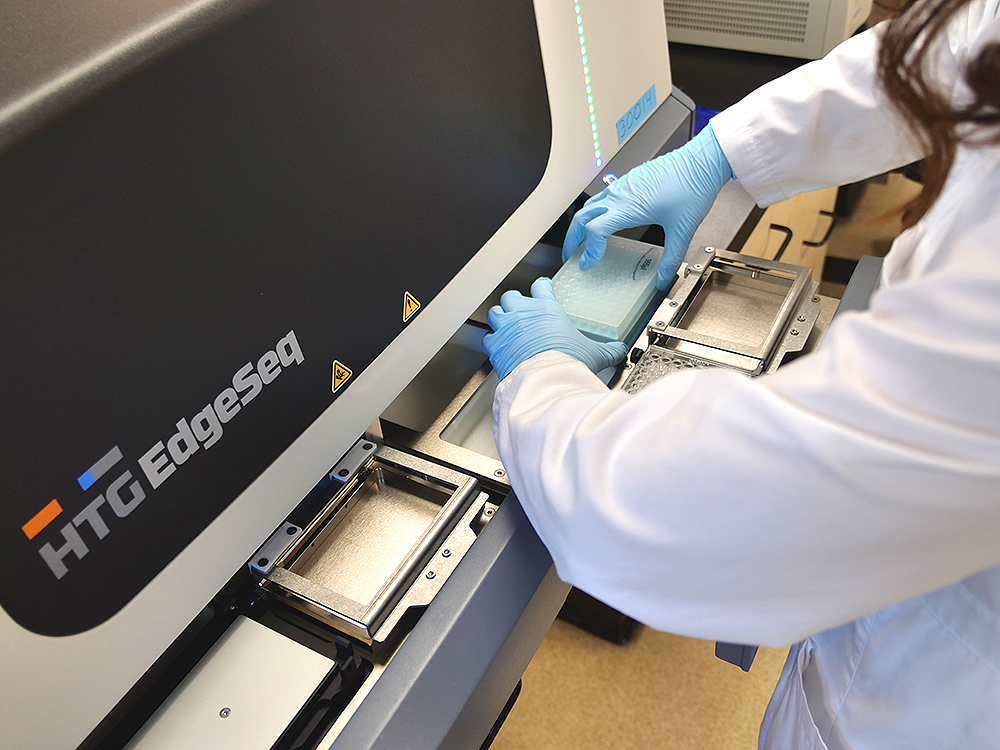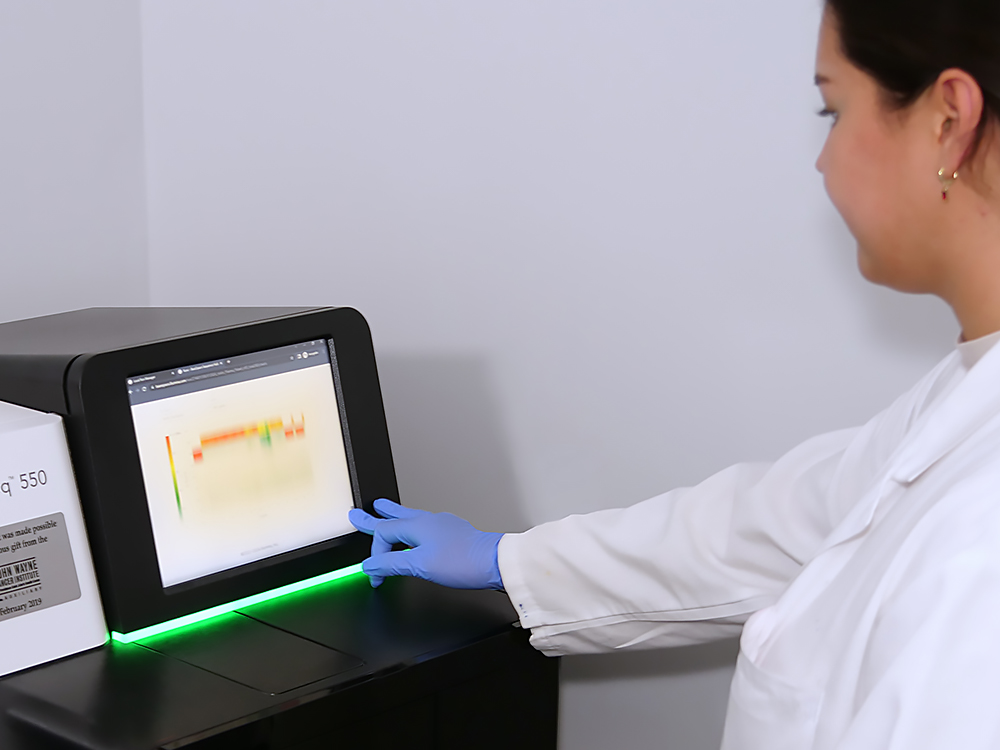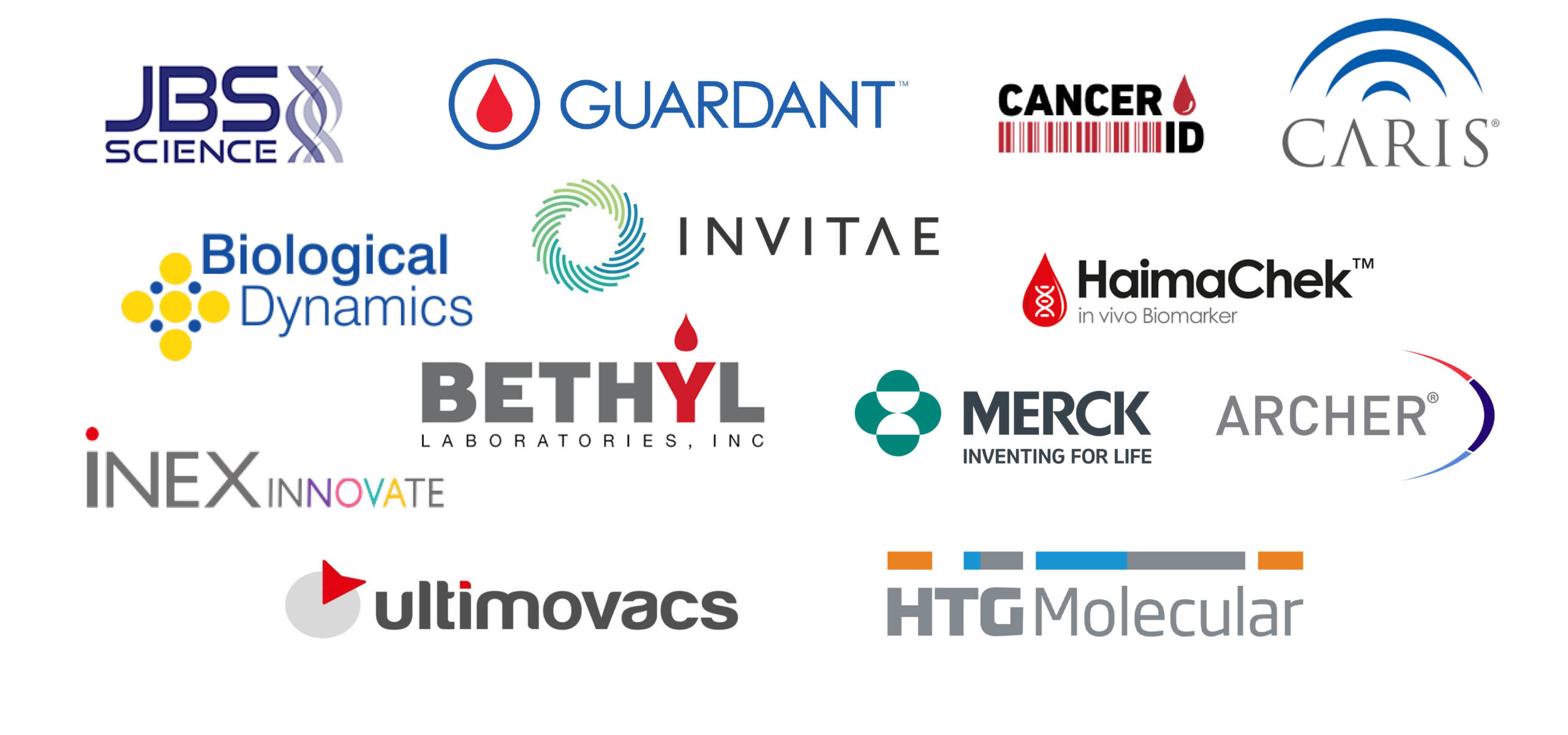General Sequencing Services
- Human and Mouse Exome
Exome enrichment focuses on the coding regions of the genome and is a cost-effective alternative to whole genome sequencing. Exome sequencing captures 50 Mbp of coding exonic regions with high specificity and coverage. - RNA-seq
Analyzing the transcriptome with mRNA-focused sequencing provides researchers with information to characterize gene expression, gene fusions, alternative splicing, and novel transcripts. Standard coverage ranges from ~20-50 million reads and can be scaled to meet specific project objectives. - Targeted Resequencing and Custom Enrichment
Isolating genomic regions of interest with targeted gene enrichment panels allows for cost-effective, focused detection of germline and somatic mutations. Pre-defined cancer panels cover over 300 cancer-related genes with high specificity and deep coverage. Custom gene panels can also be designed to meet specific project objectives. - OMNI-ATAC-Seq
OMNI-ATAC-Seq is a new and improved assay designed to decrease background noise generated by mitochondrial DNA by ~20% from the original ATAC-Seq method for transposase-accessible chromatin region profiling. Explore chromatin accessibility and identify open/closed regions of DNA with only 10k cells. Standard coverage from ~50 million reads and can be scaled to meet project objectives. - miRNA-seq
Extraction-free direct assay on HTG EdgeSeq of 2,083 miRNA from plasma, serum, FFPE, and cell lines. Low-input requirements make this assay ideal for limited specimens. Standard coverage is ~1 million reads per sample. - ChIP-seq
Analyze interactions between genomic bound protein and DNA to identify binding-sites for transcription factors and other proteins. Standard coverage from ~20-50 million reads per cell line and can be scaled to meet project objectives. - EPIC 850k Methylation array
Quantitatively interrogate DNA methylation level for >850K CpG sites from a variety of specimen sources, including FFPE tissues, cell lines, and frozen tissues. - Sequencing for Pre-made Libraries
We can also sequence your pre-made Illumina-compatible libraries. The NextSeq 550 and MiSeq are priced on a per run basis.

Instruments
Our Sequencing Center is an Illumina Propel-Certified Service Provider, one of a few select laboratories in a collaborative service partnership with Illumina that have demonstrated proficiency in next generation sequencing at the highest industry standard.
- Illumina NextSeq 550
High output mode can generate up to 400 million reads per run with single read sequencing and up to 800 million reads per run with paired-end sequencing and offers rapid turnaround time. Mid output mode can generate up to 130 million reads per run with single read sequencing and up to 260 million reads per run with paired-end sequencing. - Illumina MiSeq
Ideal for small scale projects with rapid turnaround time. In a single run the MiSeq can generate 12-15 million reads with single read sequencing or 24-30 million reads with paired-end sequencing. - Oxford Nanopore
Direct and real-time sequencing of native DNA/RNA, or sequencing amplified samples. Read length is not limited from short to ultra-long, and beneficial for methylation research without bisulfite conversion biases.

Policies and Pricing
Pricing will depend on the assay types, the number of samples to be processed, read depth, read length, and the run mode and turn-around time desired. To learn more about our sequencing services or schedule a consultation to discuss your research project and sequencing needs, please email us at Eleanor.ziarnik@providence.org or Dave.Hoon@providence.org.
For Saint John’s Cancer Institute internal investigators, the study designs as well as the up-front source of funding should be discussed. Project tasks are completed in received orders and the level of work. Trello website is shared with all internal investigators for weekly updates of on-going projects.
Sample Requirements
Quality of starting material is a key factor in producing optimal sequencing data and results. The following are general sample requirement guidelines for our library preparation and sequencing services. All samples must pass our quality control requirements before they can be processed for sequencing. Please contact us for more detailed sample submission requirements specific to your project.
- General Guidelines
In prior to submission, all DNA/RNA samples should be extracted and de-identified. Any human specimens must be NIH IRB approved. The specimens should be suspended in water, low TE, or elution buffer and stored in low binding 1.5 ml tubes. The top and side of each tube should be clearly labeled with the sample name, date, institution and/or PI’s initials. The sample submission forms including the quality analysis results are required for sample submission. - DNA Sample Requirements
Please provide sample analysis results measured by Qubit, Agilent 2100 Bioanalyzer or TapeStation in one or multiple forms. NanoDrop quantification alone is not recommended. - Exome Sequencing
Purity: OD260/280 = 1.8-2.0 without degradation and RNA contamination
Concentration: 30ng/µl or above
DNA amount for each library: ≥400 ng high quality genomic DNA or ≥2.5 µg FFPE DNA - RNA Sample Requirements
Please provide analysis results of the RNA sample using at least two of the following methods: Qubit, NanoDrop, Agilent 2100 Bioanalyzer, and Agilent 2200 TapeStation. Please purify samples, avoiding contamination by polycarbonate, protein and exonuclease. Please send samples in molecular-grade water or Buffer EB without nuclease inhibitors such as EDTA. - mRNA Sequencing
Purity: OD260/280 = 1.8-2.0; OD260/230 >1.8; RIN ≥ 8 for high quality total RNA or %DV200 ≥ 30% for FFPE total RNA
Concentration: ≥20ng/µl
Total RNA amount for each library: ≥500 ng of high quality total RNA or ≥300 ng of FFPE total RNA




